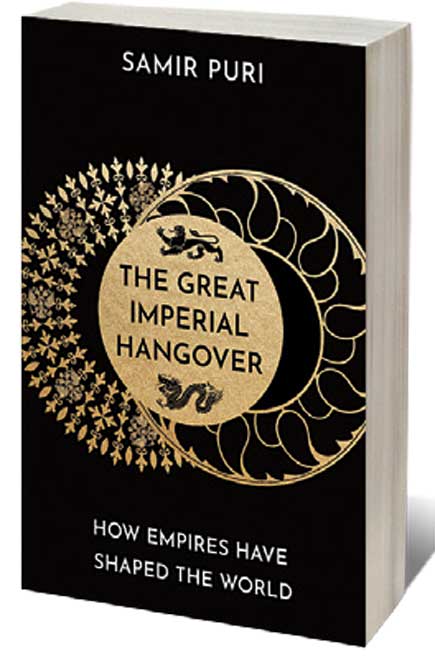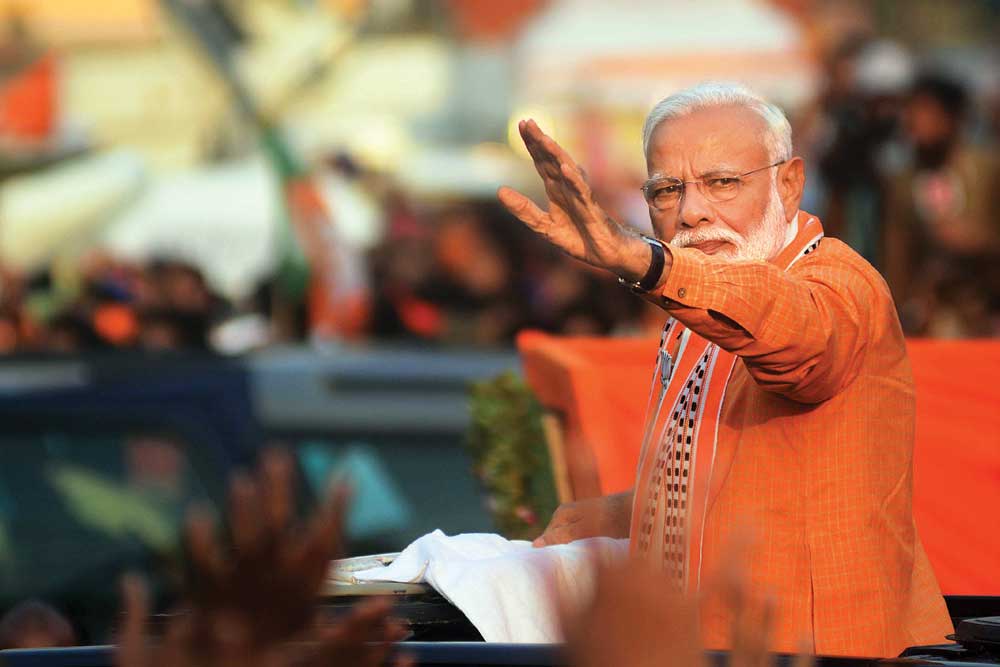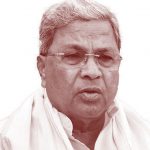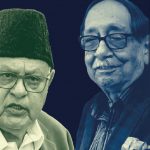Imperial Inheritance
Has the empire been the default model for global governance?
 Zareer Masani
Zareer Masani
 Zareer Masani
Zareer Masani
 |
21 Aug, 2020
|
21 Aug, 2020

/wp-content/uploads/2020/08/Imperial1.jpg)
The Secret of England’s Greatness (Queen Victoria presents a Bible) by Thomas Jones Barker, c 1862
THE APPEARANCE OF yet another tract on empire in the present global climate might seem like an act of hubris. Samir Puri’s The Great Imperial Hangover goes even further in trying to encapsulate 5,000 years of world history in 300 pages. The result is well written, intelligent and gripping, but inevitably itself suffers from the imperial overstretch which Puri rightly blames for the collapse of so many empires.
This survey of imperialism and its continuing relevance begins very sensibly by reminding us ‘empires are still shaping the 21st century in profound ways’, even though we live in ‘the first empire-free millennium in world history’. Puri himself is not a historian but a political scientist, and his avowed purpose is ‘to unlock many of the most troublesome conundrums in contemporary global affairs’. He sees imperial expansion as a near-universal, often positive human urge to promote order, trade, modernity and culture. ‘If empires had not existed,’ he argues, ‘it would have been necessary to invent something like them… .’
Given his preoccupation with contemporary problem-solving, Puri, not surprisingly, begins by examining the informal empire that still bestrides the world, that of the US. ‘I never knew a man who had better motives for all the trouble he caused,’ wrote Graham Greene in his novel The Quiet American. Puri quotes both Barack Obama and Donald Trump on America’s role as ‘the world’s reluctant sheriff’. He traces the paradox of US neo-imperialism emerging out of America’s birth in revolt against British colonialism, then swallowing Native and Spanish American territories, then intervening decisively in two, European-initiated World Wars and, less successfully, in Vietnam and Iraq.
Pointing to Obama’s neglect of his own red lines in Syria, Puri rightly concludes that the US ‘finds it is damned if it does and damned if it doesn’t get involved in the world’s problems’. He also explodes the American independence myth by reminding us that its war of independence was also it first civil war, with large sections still loyal to the British Crown. His thumbnail sketch of American history wisely warns: ‘Repudiating and then effectively replicating empire embedded a paradox deep into the American psyche.’ He shrewdly observes that the 20th century US was able to project its soft power worldwide because new telecommunications and broadcast media allowed this.
Puri is less accurate or even-handed in his account of the British Empire which the American eventually succeeded. He rightly points to British imperial overstretch by the 20th century, but attributes its collapse to the Second World War, not the First, which was arguably even more decisive in beginning the imperial handover to America. He dismisses the peaceful decolonisation of Hong Kong and so many other British possessions in favour of a childish joke about flag-flying by the comedian Eddie Izzard. He also takes seriously ill-sourced, anti-British polemics by Shashi Tharoor, although agreeing with Niall Ferguson, whom he otherwise dismisses: ‘The British Empire undoubtedly diffused institutions and ideas that remain with us, wiring together distant parts of the globe in a preview of modern globalisation.’
Past colonialism by Europeans, some more benevolent than others, has been a two-way process, in which the colonisers have exported their languages and cultures across other continents, while themselves importing foreign profits and migrants
Where Puri is on even thinner ice is in suggesting that the imperial legacy, buried deep in Britain’s collective unconscious, resurfaced after 9/11 in encouraging the UK to play Athens to America’s Rome. Hence Blair’s enthusiasm for the 2003 Iraq War, conveniently attributed to ‘absent-minded’ imperial hangover, instead of his own messianic instincts. The British vote for Brexit is similarly attributed to a subconscious, imperialist urge to go it alone, not to the Euroscepticism of a generation that has grown up in the European Union. In neither case does Puri come up with evidence, just a hunch, for which he hastily denies causal claims.
From Brexit Puri turns to the European Union itself, pointing to the fact that past empires and resistance to them lie deep in the European DNA, both fuelling post-imperial aims and undermining them. As a former President of the European Commission, José Manuel Barroso, once commented: “Now we have… the first non-imperial empire… Twenty-seven countries that freely decided to work together, to pool their sovereignties.” With its roots far back in ancient Greece and Rome, a more recent European empire was the Holy Roman Empire, a loose confederation of mainly German kingdoms, held together by the dynastic glue of the Habsburg monarchy. The Habsburg empire had evolved into a highly diverse, cosmopolitan, multi-ethnic grouping in which several national groups ranging from Austro-Germans to Jews, Hungarians and Slavs co-habited fairly peacefully in many regions.
The fall of the Habsburg monarchy in World War I and the new post-war application of the principle of national self-determination tore apart these mixed communities, rewarded ethnic cleansing and fuelled waves of extreme nationalism, typified by the rise of Nazism in Germany. Like Napoleon’s France a century earlier, Nazi Germany could be seen as an attempt forcibly to unite Europe’s nations under the yoke of a single, dominant imperial ruler. The post-war European settlement attempted to guard against such domination ever being repeated.
‘The EU is not an empire,’ Puri concedes, ‘but in its commitment to unification between its members, and to enlargement with new members, it has acquired quasi-imperial habits… It is a modern, democratic inheritor of imperial legacies… .’ He points to the fact that past colonialism by Europeans, some more benevolent than others, has been a two-way process, in which the colonisers have exported their languages and cultures across other continents, while themselves importing foreign profits and migrants. The EU, he argues, is ‘reminiscent of a civilising mission, this time predicated on promoting peace, democracy and good economic practices… ’. A ‘Europeans know best’ attitude, inherited from past empires, has produced an irritating tendency to preach to others, but may result in modern Europe feeling increasingly isolated in today’s multi-polar world.
Europe’s most direct challenge today comes from the neighbouring land empire of Russia, with which its relationship has been ambivalent for centuries. ‘A Russian is self-assured,’ wrote the great Leo Tolstoy, ‘just because he knows nothing and does not want to know anything, since he does not believe that anything can be known.’ Puri quotes this as a telling comment on the Russian Empire, which has straddled both Europe and Asia for four centuries, whether under the Romanov monarchy, Soviet Communism or the current Putin regime.
Having been part of an international mission on Russia’s recent invasion of Ukraine, Puri concludes that part of the problem is that past empires had flexible frontiers, not today’s hard borders. But it’s hard to see what practical difference this made when Russia’s empress Catherine the Great annexed Crimea and Ukraine in the 18th century. Maps, however disputed, were a feature of all modern empires. Puri rightly observes that Russia’s annexation of Central Asian, Muslim lands was similar to Western Europe’s acquisition of overseas colonies. Having briefly achieved independence after the Bolshevik takeover of 1917, these small, subject nations were forced back into the Soviet fold during the 1920s, regained formal independence after 1990, but remain clients of their large Russian neighbour today.
Although the end of the Soviet Union left the world free of formal empire, Puri is in no doubt that Putin’s global muscle-flexing and interventions are part of ‘the gravitational pull’ of its imperial past. China, he points out, is in much the same position, though it can claim it has not waged war on its neighbours. The Tibetans, the Uighurs and India might disagree. Though never directly colonised, China can claim to have been plundered by others, notably the British in the Opium Wars. The result is a toxic mix of imperial ambitions with a deep sense of anti-Western grievance.

After a whirlwind tour of China’s imperial and Communist past, Puri identifies its current, innocent-sounding ‘Belt and Road Initiative’ as a classic imperialist system to gather cheap natural resources from other African and Asian countries, who then depend on China for their own economic survival. Surprisingly, Puri does not apply similar imperialist motives to India, as though two centuries of British rule had eradicated two millennia of indigenous imperialism, dating at least as far back as the Mauryan Empire of the 2nd century BCE.
While celebrating the achievements of India’s past empires, whether Hindu or Muslim, Puri seems to assume that the imperial impulse ended with nationalist resistance to the British Raj. What that ignores is that the imperial mission of the Raj, like it or not, united all India for the first time in its history as a centralised state with a pan-Indian civil service and army and a single common market. Of course, most of that occurred through wars of imperial annexation by the British, but their indigenous nationalist heirs were quick to assume the same imperial paramountcy over 540 notionally independent princely states, to crush with brutal military force secessionist movements in subject nations like Kashmir, Nagaland and Mizoram, and to impose the Raj’s uniform systems of language, administration, justice and finance as strictly as their predecessors. The result has been a successor-state every bit as imperial in its rituals and political practice as the Raj or the Chinese model Puri and the rest of us like to decry.
India’s imperial impulses have been sometimes less visible because cloaked in a rhetoric of Gandhian non-violence. But Gandhi’s pacifism has in no way prevented India’s no-holds-barred wars with Pakistan in 1948, 1965 and 1971, or in its nuclear arms race. Surprisingly, Puri’s somewhat rosy history of India includes several factual inaccuracies. The sepoy mutiny of 1857 was patently not ‘accompanied by mass civil unrest’. The last Mughal emperor, far from trying ‘to capitalise on the unrest’, was forced by the rebels to become their reluctant and nominal figurehead. There was no ‘mass drafting’ of Indians into Britain’s World War I army. British India had no conscription, but nevertheless supplied the world’s largest volunteer/mercenary army, made up predominantly of the so-called martial races, who had been professional soldiers for generations. The 1916 Easter Rising in Dublin, which inspired Indian nationalists, was not a rebellion by veterans but an extremist putsch that was highly unpopular with most Dubliners, especially the angry wives of the many hundreds of thousands of Irish troops loyally fighting in France for King and Empire.
Puri swallows several Indian nationalist founding myths. Contrary to his assertion, no machine-guns were used in the notorious Jallianwala massacre of 1919. Gandhi never offered Jinnah ‘the chance to form the first independent government’ of India, nor was he ever in a position to do so, although he did moot this as a half-serious suggestion in talks with Viceroy Lord Mountbatten, who promptly dismissed the idea as a ploy unacceptable to the rest of Congress. Bringing India’s political evolution up to the present era of Hindu chauvinism, Puri strangely concludes that India has been a victim of imperialism rather than its inheritor, ‘a survivor of other people’s imperial designs’.
Turning to the Middle East, there are again some factual errors, probably inevitable in such a wide-ranging account of its colourful history under empires as diverse as the Byzantines and the Ottomans. We are told that Reza Shah, who established Iran’s Pahlavi monarchy in 1921, ‘did not pursue a Westernizing agenda akin to Attaturk’s’ in neighbouring Turkey, although precisely the opposite is true, and his Westernising agenda continued under his son, the tragic last Shah. We are told that that the Egyptian dictator ‘Nasser’s high point’ came ‘with nationalization of the Aswan Dam’, surely the Suez Canal.
WHERE PURI IS correct is in reminding us of Jewish religious freedom under the Muslim Ottomans and concluding: ‘There is no inevitable hostility between Jews and Muslims, but while both communities may have been able to fit into an empire, clearly it has not been possible to fit them into a state.’ He even credits ISIS with an ‘embryonic’ empire-building project in abrogating the border between Syria and Iraq. He reminds us that ‘the iconography of ISIS laid claim to a distant Islamic imperial past…’.
When it comes to Africa, even more than India, Puri seems to swallow uncritically the entire anti-colonial gospel of a continent innocent of original sin, plundered, ravaged and enslaved by wicked European colonists. While accepting that colonialism ‘is not the only cause of Africa’s contemporary problems’, he quotes a Cameroonian academic to say that ‘the gift of modernity (by the West) was poisoned by the giver’. Puri spares us no condemnation of the European-led transatlantic slave trade, but he does not examine the roots of that trade in Africa’s indigenous traditions of slavery, enforced by its own tribal kingdoms on those they conquered and later in their often lucrative transactions with European slavers. Nor does he differentiate between European and Arab colonisation of Africa, or between the European powers themselves, exemplified by Western condemnation of Italy’s invasion of Ethiopia. After all, it was to Britain that Africa’s only indigenous emperor Haile Selassie fled in the 1930s to escape Mussolini.
Samir Puri even attributes Narendra Modi’s landslide in the 2019 election to ‘post-imperial unease’, instead of India’s own home-grown, Hindu-dominated neo-imperialism
Despite his censure of all European colonialism, Puri paradoxically blames it for ending its rule ‘before Africa’s independence movements could really cohere’. So they were damned if they did or didn’t. While the new African states and borders undoubtedly owed their origin to colonial accident, the tribalism, corruption, wars and dictatorships that succeeded Western rule can hardly all be blamed on those colonial origins. Referring to the failed state of Congo, Puri says: ‘While responsibility for his misrule clearly rests with his own indulgences, Mobutu was also a product of colonial legacies. Although it is an oversimplification to offload the blame to Belgium, Mobutu seemed to mimic the behaviour of King Leopold through his one-man rule… .’ And yet, the harsh reality is that, according to basic indicators of health, nutrition and civil liberties, several African states were better off under European colonialism than under their indigenous successors.
Referring to independent Sudan’s dictatorships and famines, Puri concludes that it is ‘ahistorical’ to use the jargon of ‘state failure’, and he insists instead on the importance of colonial legacies. But nowhere does he spell out how pre-colonial Africa, with its ‘blurred’, traditional centres of power would have resolved such tensions more peacefully. Indeed, all the evidence is that pre-colonial life, far from a rural idyll, was, to quote Hobbes, nasty, brutish and short, except in those regions like Ethiopia, Ghana, Mali and Zimbabwe, where African kingdoms established stable empires of their own. A contemporary paradox which Puri attributes to their post-colonial subconscious, is the desire of so many millions of young, would be economic migrants to travel to the European countries that once ruled their grandparents.
Reflecting on Africa’s new imperial patron, China, Puri calls the Chinese involvement ‘transactional rather than colonial’, though it’s not clear what the difference amounts to. ‘China’, Puri explains, ‘is hungry for resources that African countries are willing to sell. In a quid pro quo, China offers its African client states investment in roads, railways, ports and factories.’ It’s a recipe familiar to any student of imperialism, and Puri concedes that ‘the dangers of dependency are real, based on China’s debt-fuelled model of infrastructure provision.’ Where he’s on thinner ice is in the curious suggestion that China might be offering Africa political lessons in retaining established leaders, the older the better, which might produce less coups than the attempts at democracy left behind by Europeans.
Returning to the bigger global picture, there is little doubt that empire has been the default mode of governance for the world across the millennia, everywhere from Aztec Mexico to Japan, driven by basic human instincts for secure borders, economic prosperity and political kudos. ‘Every one of us,’ says Puri, ‘carries an imperial inheritance that is personal to them.’ Very true, but it’s hard to see, as he suggests, that those imperial legacies are driving everything from Anglo-Russian tensions over Russian chemical attacks on British soil to Britain’s own vote for Brexit. Puri even attributes Narendra Modi’s landslide in the 2019 election to ‘post-imperial unease’, instead of India’s own home-grown, Hindu-dominated neo-imperialism.
Where Puri is perceptive is in concluding that Chinese imperialism, unlike the West’s version, doesn’t expect its clients to convert to its civilisation. The West’s desire to be mimicked, he predicts, will stiffen its resistance to Chinese influence. One must also agree with him that, while ethnic mixing has been one of the most enduring legacies of empire, the world’s cosmopolitan ‘travelling elite’ are unlikely to convert the masses who stay home. Nor are culturally homogeneous nation-states likely to wither away. As Russia, China and India all demonstrate, imperial legacies can be preserved at their national core and used to reinforce new forms of imperial hubris. Imperialism and nationalism have never been mutually exclusive. Nazi Germany remains a potent reminder that the two can be a toxic combination.

/wp-content/uploads/2025/07/Cover_Dalai-Lama.jpg)












More Columns
From Entertainment to Baiting Scammers, The Journey of Two YouTubers Madhavankutty Pillai
Siddaramaiah Suggests Vaccine Link in Hassan Deaths, Scientists Push Back Open
‘We build from scratch according to our clients’ requirements and that is the true sense of Make-in-India which we are trying to follow’ Moinak Mitra